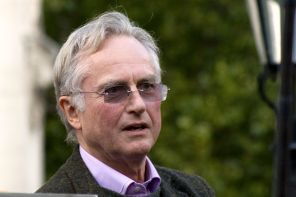This month's issue of Christianity Today evokes the epoch-making 1966 cover of Time magazine, which asked, strikingly, "Is God Dead?" In Christianity Today, which since the 1950s has been the flagship journal of the evangelical movement, William Lane Craig replies, "God Is Not Dead Yet." Dr. Craig, a professor of philosophy at Talbot School of Theology, has made a name for himself as an apologist and veteran debater against prominent atheists. A winning smile and clean haircut, visible from every corner of his website, accompany a nimble mind with vast aptitude for repeating intricate theological arguments.
Craig's feature article makes clear that he means something somewhat more decisive than "yet" might give on. God is not only hanging on for dear life against an inevitable death "yet" to come; rather, the evidences for His existence are causing, he claims, a growing "revolution" in the ivory tower. The scientism of New Atheists like Richard Dawkins is now obviously "bygone": "Atheism, though perhaps still the dominant viewpoint at the American university, is a philosophy in retreat."
In what follows, he combines a tango through some of the major traditional arguments for God's existence (almost exclusively in terms of their modern celebrators) with a revealing discussion about the performative place of natural theology—the study of God through nature's evidence—in modern culture.
Craig's confidence in his revolution struck me, a product of entirely secular education (even with two degrees in religion), as a testament to the critical mass of the evangelical academic subculture. Among my teachers, by and large, traditional arguments for the existence of God were at best fatally flawed and at worst totally irrelevant. I have, however, seen enough to know that Craig isn't making this stuff up. At the many specifically Christian colleges and universities in the United States, where professors are often required to assent to certain creeds in order to teach, there is much more patience for exploring such arguments. I have met a fair number of people doing so in Britain as well, even in places like Oxford and Cambridge. The journal Faith and Philosophy has become a major outlet for new interpretations of the proofs, and there is a broad audience available among seminarians and philosophy-oriented "small groups" attached with churches all over the country.
Whispering to his coreligionists in Christianity Today, to his subculture, Craig does not do justice to what the revolution is up against. His bygone atheism is a straw man. A quick look at the religion section in any major chain bookstore shows a whole crop of habitable sequels to the New Atheists' opening salvos. There are atheism readers, atheist spiritualities, and all the chicken soup an atheist soul could need. Rather than lacking "intellectual muscle," as Craig puts it, the online community formed around Edge.org shows that some of today's most dynamic scientific minds all but assume atheism. Indeed, it seems implausible that the "dominant viewpoint at the American university" would be lacking intellectual vibrancy (unless, of course, Craig is claiming the intellectual bankruptcy of American academia). No; if nothing else, today's atheism is positively fueled by intellectual inquiry.
This tone of premature celebration carries over to Craig's treatment of what he considers to be the strongest arguments for the existence of God going. His arguments are the traditional favorites, buttressed by lists of names of the living philosophers and cosmologists who have brought them up to date: the cosmological (because the universe exists), the kalam (an Islamic variant of the cosmological), the teleological (because of order in nature), the ontological (because of the very concept of God), and the moral (because people seem to have an innate moral compass). Throughout his presentation, though, Craig chooses not to inform his audience in Christianity Today of the vibrant critiques available for each of these. He represents them as just about a done deal.
I'll take a couple of quick examples. For one, Craig is almost cheerful about intelligent design theory, though he fails to mention its lack of support among credible biologists. He quickly moves on to mention the fine-tuning argument, which cites the incredible coincidence of cosmological circumstances that made human life possible. If gravity were just a tiny bit stronger or weaker, we'd have never showed up. And such precise work could only happen by divine design, right? As has been aptly pointed out, coming to that conclusion assumes the premise that human life was the purpose of creation to begin with, rather than a fortunate (for us) consequence. The fine-tuning argument is like suggesting that, just because Britney Spears was born in America, America exists in order to give birth to Britney Spears. And then, in his account of the moral argument, Craig suggests that dissenters will rush into the sophistic tango of Plato's Euthyphro: "Is something good because God wills it, or does God will something because it is good?" Today, though, more sophisticated nontheists look to compelling evidence in human psychology and animal behavior that moral instincts biological mechanisms that evolved to facilitate group cooperation and kin loyalty—both advantageous things to be able to do in nature. None of this is mentioned.
On top of that, Craig attempts to hack the tried-and-true gap between the "god of the philosophers" and the Christian Father. The cosmological arguments, traceable to the ancient Greeks (Aristotle in particular), speak of an incredibly abstract creator. For Plato and Aristotle, the First Cause of the world is not a person but a force, a manifestation of transcendent reason. Even Anthony Flew, the atheist philosopher whose recent conversion to theism has thrilled evangelical apologists, insists that his god of fine-tuning and intelligent design is a far cry from the God of the Bible. Scandalously, Craig identifies the cosmological God as "plausibly timeless, spaceless, immaterial"—fine, until he gets to—"and personal."
Again, I do not mean to insist that these arguments are categorically wrong. Only that atheists and theists alike will never quite prove their "intellectual muscle" until they stop misrepresenting each other and misinforming their readers. Admittedly, Craig has limited space in the magazine format and cannot be expected to cover everything. He can, however, steer clear of libel against intellectually-fulfilled atheists.
The article ends on a fascinating chord: Why should we bother with proofs for the existence of God anyway? Between anti-intellectualism and a perceived need to be relevant to a "postmodern" culture, evangelicals have usually avoided such things. Craig answers that, in its continued respect for science, our present culture is still "modern." ("Modernism" and "postmodernism," as bywords in evangelical theology, mean something a little different than they did in your art history classes; "modern" is almost unequivocally bad.) In a modern society, which takes science as true and human values as infinitely flexible, establishing the scientific credibility of the idea of God will make people more likely to accept the gospel's system of values. As a result, the evangelical goal of spreading the gospel needs natural theology.
Alongside the postmodern penchant for cozy narratives and "emergence," Craig is working against a venerable current at the fringes of his community. In 1934, the German master-theologian Karl Barth famously answered a fierce "Nein!" to suggestions that Christian belief should rest on human knowledge of nature and history. At the time, Barth's polemic was against the "scientific" racial politics of the Nazi regime that more and more German Christians were embracing. This experience led him in a decisive turn away from putting God to nature's test. Instead, Barth believed, Christians should focus on Jesus Christ and the biblical message of salvation, letting the scientific cards fall where they may. Faith must come first, unshakable by science and by human politics. Barth's concern goes back at least to Augustine in the 4th century, who warned against hinging Christian faith on things so accidental as a scientific interpretation of Genesis or the Roman Empire, which was collapsing around him.
Craig doesn't mention Barth in the article, but by implication he answers, "Ja!" The part of human nature that Barth wanted to bracket for the sake of Christ—the habit of acting and thinking based on how we think nature and history function—Craig wants us to be able to embrace again. In American experience, at least, the endless evolution controversies seem to suggest that natural theology is here to stay. Christians want their beliefs and their science, and they insist both can and should be had in happy harmony. Indeed, Anthony Flew—the atheist-turned theist mentioned above—once argued that this isn't such a gamble as Augustine thought; concepts of God are flexible enough to fit around pretty much any kind of evidence that might arise.
The question that concerned Barth, however, is what we will choose when really pushed: the Sermon on the Mount or "natural" theories like the need to exterminate an ethnic group (especially when the group is accused of killing the sermon-giver). Unlike Barth, Craig is optimistic that good science will point the way to faith. And his prognosis of the modern world is that we need that science in order to learn faith. Craig's cosmological theories are certainly a far cry from gas chambers, but they do raise a terrifying worry for Christians and atheists alike. Why is the truth so difficult for other people to recognize, even when we proclaim it to them?




